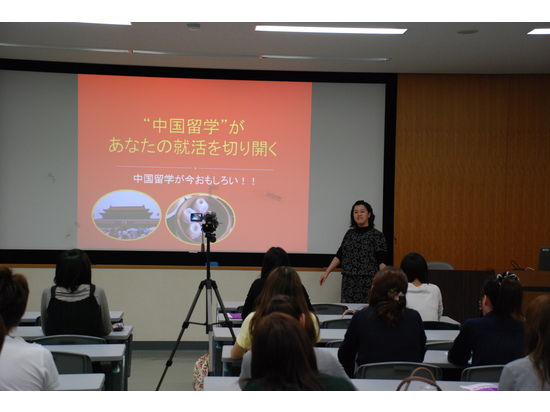Lecture for Study Abroad in Asia 2010
2010/12/21

The CIE (Center for International Education) and GP Project Team held four "Lectures for Study Abroad in Asia" at the CIE on the Nakamiya campus in October. About 150 students in total participated and received information about “Learn in English” and “Study in Asia”.
1) Oct. 1. (Fri)
Instructor: Akinari HOSHINO (CIE staff, in charge of Study Abroad in Asia)
Mr.Hoshino focused on the following three points, and explained the advantage of studying in Asia today.
①English use frequency in Asia
②Educational level of universities in Asia
③The meaning of studying abroad in Asia
①= He mentioned that there is a larger than expected English speaking population in the world, and English is frequently used in business and schools in Asia. He also pointed out that "the ability to understand diversified English is necessary".
②= The quality of the universities (the partner universities also included) in Asia is higher than that of the first class universities in Japan based on the university ranking and we have confirmed that they have a lot of courses offered in English.
③= He explained that enterprises evaluate people who have had experience studying abroad in Asia, and they want human resources who are well versed in Asia through experience of living overseas.
2) Oct. 8 (Fri)
Instructor: Mitsuharu TANAKA (Associate Professor, Kyushu University)
Dr.Tanaka gave the example of “Change from Galapagos” and emphasized the necessity to go out to foreign countries in order to not be left behind in global evolution and to pay attention to the world. He explained the successful case of the internationalization policy and English language education policies of South Korea, and described the meaning of studying in South Korea which has resulted in the enterprises of South Korea coming to the forefront of global society.
Moreover, he mentioned the need clarify the “for what’ (besides learning languages) of study abroad.. Companies evaluate not only one’s language ability but also “for what” one studied abroad.
3) Oct. 15 (Fri)
Instructor: Yuichiro FUKUMARU (senior consulting staff, NOKIA Japan)
Mr.Fukumaru presented an outline of Thailand (politics, economy, culture, and national character) by using animation and the photographs. He explained that Thailand is a country friendly to Japan, and the national character is similar to that of the Japanese.
Moreover, using materials from JETRO and a Thai government agency, he explained the relation between the two countries has become stronger as Japanese companies (mainly manufacturing) set up factories in Thailand. He said that many international programs based on English education exist in the universities in Thailand, and pointed out the possibilities of study abroad in an English environment. He spoke to the students of the charm of Thailand, and explained both the advantages and disadvantages of study abroad in Thailand.
4) Oct. 22 (Fri)
Instructor: Satomi AIHARA (Instructor, Kansai Gaidai University)
Ms.Aihara introduced the outline of studying abroad to China and the internship program at Kansai Gaidai, and the advantage of studying abroad to China.
She emphasized that the system of study abroad in China, and the internship program in spring and autumn provide students with a lot of opportunities. She showed the classrooms, the dormitory, and the appearance of a town in a video, and explained the image of studying abroad to the students.
She described the career formation those who experience studying abroad in China with examples of several students and graduates. Moreover, she stressed that China is a necessary and indispensable business partner for Japan by using tables, graphs, and so on. She noted too, that enterprises recruit those who are well versed in China.




